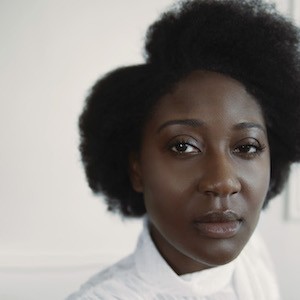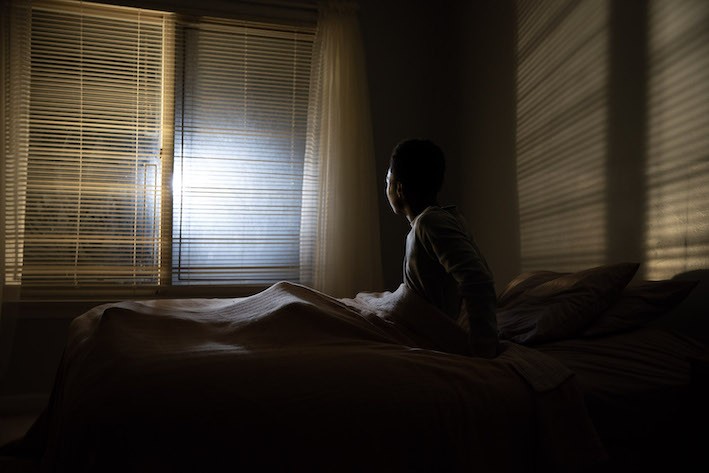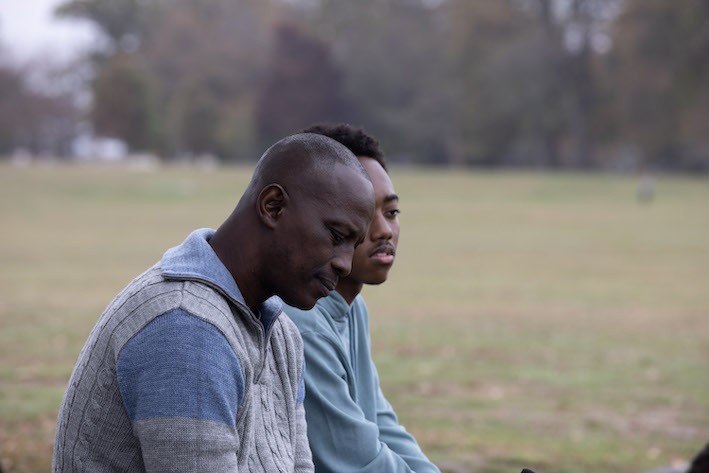On A Global Scale: Ellie Foumbi '17 on Waiting
On A Global Scale is a bi-weekly series about international co-productions by Columbia filmmakers.
Welcome to another edition of On A Global Scale. This bi-weekly series celebrates the international spirit of the Columbia University film program and the incredible global collaborations coming out of it.
Originally, alumna Ellie Foumbi '17 had not planned for her upcoming film Our Father, The Devil to be her first feature. But the reason why she chose the script to apply to the Biennale College Cinema Initiative was simple: “I didn’t want to wait anymore. I’ve tried to make a bigger feature for a couple of years, and I started to feel doubt about how long it would take.”
The switch paid off for Foumbi, who was selected as one of only four recipients of the initiative's grant at the Biennale di Venezia. Setting out to promote new talent in film and to help emerging directors make micro-budget feature films, the College Cinema Initiative funded Our Father, The Devil with 150,000 Euro, to be presented at the 78th Venice International Film Festival 2021.
Suddenly, Foumbi was on course to make the film. “My agent said: Why don’t you write something smaller? And I just wanted to shoot something. When I saw the call for the Biennale, I remembered this story because it had started to bug me again and thought this could be a good fit. I didn’t think I’d get selected at all, I just wanted to rework this story with the ambition of creating something good.”
Foumbi’s film follows an antisocial African refugee whose tranquil existence in a sleepy mountain village in the south of France is overturned when she suspects the new parish priest is none other than the warlord who slaughtered her family. Foumbi started the project at Columbia where she wrote the first iteration of the script in 2015. “The initial version was set in the US and it just wasn’t working. I think it was due to the cultural elements embedded in the script; the character just didn’t fit here in the States. So, when I applied to the Biennale, I had to think about what was and wasn’t working. I realized it should be set in Europe because there is just a stronger connection between francophone Africa and Europe and France in particular. I wrote the script in English, but French is my first language, so it was interesting to translate it back again.”
Foumbi was born in Cameroon “where the film industry is more or less non-existent. I fell in love with film when I moved to the States when I was five. I started off as an actor and I was always an avid reader and writer from a young age. Eventually, I found myself enjoying the process of working on scripts and so I knew I wanted to go to a school that focused a little more on screenwriting. Columbia was a great fit, also because I’m from New York and wanted to stay close to my family. I didn’t initially think I was going to be directing but that’s what happens here. I’m a visual person, but I didn’t see myself as the person in charge and I needed that kind of environment to push me out of my comfort zone.”
The inspiration for the film was drawn from conversations with her family. “My father worked for the UN for many years. He was working with the Rwandan government back in the early 2000s in helping to bring the country back together after the genocide and launching a National Forgiveness Program,” Foumbi said. “I was in conversation a lot with him and my sister who did an exchange there. She told me about the tensions; a lot of people were still living next door to the people of the other tribe that had slaughtered their families, so there were revenge-plots. I was thinking a lot about how people move on after a genocide or more from the perspective of those who had been the murderers. Do these people deserve to be forgiven? I realized I didn’t want to write something about the Rwandan genocide per se, so I looked more broadly at other conflicts, specifically in Liberia and Sierra Leone.” Foumbi also drew inspiration from a New York Times article she had read about two Rwandan Catholic nuns who relocated to a small town in Germany. “A Rwandan guy who came to visit recognized them as nuns who had participated in the genocide. He outed them and the sheer odd circumstance that he happened to be there and recognize them I thought was so incredible–I put it in my story.”
With the script and funding, Foumbi was well on her way to making her first feature last year–until the COVID-19 pandemic hit. “We haven’t shot yet and it’s going to be tight. We originally wanted to shoot in March but decided to wait a little longer because a big part of our team will be vaccinated by then. Ironically, I think shooting in France will be a bit easier. Getting everyone there will be a challenge but once we’re in place we’ll be good to go. We’ll have more control of the situation than here in the States I think.”
Now two months out from shooting, Foumbi is entrenched in prep work, having just returned from a final location scout in France. “We’ll shoot in my producer’s hometown,” she said. “It was incredible to walk down locations. I was also able to do an additional casting in Toulouse to lock down the remaining characters. I feel like we started problem-solving a lot of things that were unknowns. The production is in good shape and I was able to spend some time with my actors. I feel good about it.”
Still, the pressure is on for Foumbi as the premiere at this year’s Venice Film Festival is approaching rapidly. It made her rethink the way she usually makes movies. “I’m doing all of post-production early, so I’m working on my score and sound design now. It’s very different, I haven’t worked this way. A part of me is very excited by this because it’s such an experiment! I don’t know if it’s going to work, but there’s something really cool about it. My editor will be on set with us, so we will be cutting as we’re shooting, and he will also put in the score as it comes in and see if it works.”
In Foumbi’s favor played the fact that another opportunity arose on short notice for her. “Film Independent and Netflix have partnered for an initiative where they pick five films from the Film Independent Alumni and I participated in the Screenwriting Lab a few years back. They reached out and asked if I had a story. There was a specific mandate that it had to be a film that talked about 2020 and the state of the country, where we were.” The result of this is the short film Home—now available to watch on the Netflix Film Club channel on YouTube.
“My producer told me about this time when he got lost in Upstate New York and there were all these American flags. He was terrified. And I thought this speaks to how things have changed in our country in terms of symbolism and what the flag means. We wrote this in October and then January 6 happened, and you saw these people beating police officers with the American flags. So, I decided to make a horror story about this symbol.” The film served as a perfect training ground for Foumbi to get back to set before her feature. “I’m very happy I shot that because I had a lot of surprises that I didn’t anticipate. The testing, how much longer things take because of social distancing. It was the hardest short I ever made because of that. We had to go back into the schedule for the feature and allow more time and make a lot of shifts as a result.”
With her eyes set on the upcoming shoot, Foumbi still has an idea for her future. She wants to stick to making films with an international and cultural lense. “I’m Cameroonian and though I do see myself as a Cameroonian-American filmmaker, I think I’ve had a very international upbringing. I went to a French school, the kinds of stories I want to tell are more international. I plan to make films in the States, but I don’t think of myself as someone who has to make films here. I don’t want to be put in a box in any way, I gravitate to whatever story speaks to me. I want to be working on all three continents and that’s part of the reason I’m starting with films set outside of the US.”
Foumbi is eager to get started; her six year wait since writing the first draft of the script is soon coming to an end. Her advice to students: “Don’t just have your one script. The film I was going to make was the script I graduated with. And unfortunately, you get out into the world and things don’t work out the way you think. So, I’d say have multiple ideas and be flexible in how things are going to come to you and be open.”
Ellie Foumbi is an actor, writer and director from Cameroon. Her films have screened at several international film festivals, placing in the Student Academy Awards Semifinals and garnering a nomination for an African Movie Academy Award. She was invited to participate in New York Film Festival’s prestigious Artist Academy. Foumbi’s projects have been supported by the Venice Biennale College-Cinema, SFFILM Kenneth Rainin Foundation, IFP’s No Borders Project Forum, Film Independent Screenwriting Lab, and Tribeca Film Institute's Untold Stories. She made her TV directorial debut on BET’s hip-hop anthology, Tales. Her first feature film, Our Father, the Devil, will be presented at the 78th Venice International Film Festival. She’s a member of the Screen Actors Guild and the Directors Guild of America.


